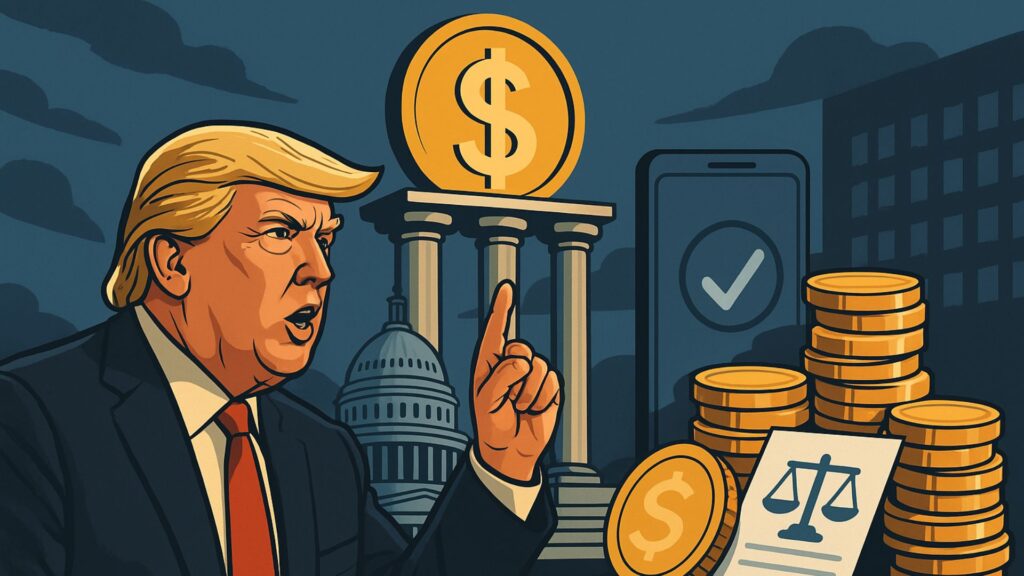The GENIUS Act has just cleared the US Senate, sparking both celebration and criticism. While many see it as a crucial step toward regulating stablecoins and securing the United States’ position in the digital asset economy, others have flagged major concerns.
President Donald Trump has taken a strong public stance on the bill, calling for immediate passage in the House. But questions over conflicts of interest and broader financial risks remain at the centre of debate.
Senate Approval Marks a Turning Point for US Stablecoin Regulation
The GENIUS Act, short for Guiding and Establishing National Innovation for US Stablecoins, passed the Senate with 68 votes in favour and 30 against.
This bill introduces a regulatory framework for stablecoins, requiring them to be backed one-to-one with either cash or short-term US government securities.
It also includes anti-money laundering provisions and aims to clarify which federal agencies will be responsible for enforcement.
Senator Bill Hagerty, who introduced the bill, has described it as a win for innovation and consumer protection.
His goal is to see it signed into law before the Fourth of July. However, getting the bill through the Senate was far from straightforward.
Some Democrats attempted to attach amendments that would have restricted sitting presidents from profiting from digital asset ventures. While those measures were largely blocked, the final version did include stricter disclosure rules for officials.
Financial experts are divided over the implications of the bill’s reserve requirements. Some warn that forcing stablecoin issuers to hold large amounts of Treasury securities could distort the broader financial system. The Treasury market has already shown signs of fragility during past liquidity crunches.
If a large stablecoin issuer were to collapse and sell off its reserves rapidly, it could overwhelm the market and disrupt government borrowing.
The House of Representatives now holds the next move. Members will decide whether to pass the Senate’s version of the bill or insist on their proposal, the STABLE Act.
While both bills share common goals, they differ significantly in oversight structures and the role of state regulators.
Trump’s Support Draws Scrutiny Amid Financial Ties and Political Pressure
President Donald Trump has been vocal in his praise of the GENIUS Act. He posted on Truth Social urging lawmakers to send the bill to his desk without amendments or delays. He called it an incredible achievement and said it would make the United States the global leader in digital assets.
His endorsement has shifted attention to the political dimensions of the bill and raised alarms about personal financial stakes.
Before returning to the office, Trump and his sons launched a decentralised finance platform called World Liberty Financial. Through it, they issued a stablecoin called USD1, which is now one of the largest in circulation.
According to financial disclosures, Trump personally earned over $57 million from the project in 2024. This revelation has led to criticism from both Democratic lawmakers and independent analysts who argue that the bill may benefit the Trump family directly.
Democrats in the House are especially wary. Some have called for amendments to prevent current or future presidents from having financial interests in the outcomes of such legislation.
Others fear that rushing to approve the Senate version without proper safeguards could legitimise a conflict of interest.
Senator Elizabeth Warren warned that the bill could allow private companies to exploit user data and dominate the payment system under the cover of financial innovation.
In addition to ethical concerns, economic researchers have warned about potential systemic risks. The GENIUS Act requires stablecoin issuers to back tokens with highly liquid assets such as Treasury bills.
While this sounds reasonable in theory, the US Treasury market has faced major strains in recent years. A surge in demand from stablecoin firms could crowd out other investors or destabilise the market during periods of financial stress.
The House Republicans are split on how to proceed. Some favour the GENIUS Act as it stands, while others prefer their own STABLE Act, which gives more authority to the Federal Reserve and allows greater involvement from state regulators.
If the House modifies the bill significantly, it will need to return to the Senate. This could delay progress and create further friction between the two chambers.
Conclusion
The GENIUS Act represents an important moment in the development of crypto regulation in the United States. However, the bill’s passage through the Senate has left a trail of unanswered questions.
President Trump’s deep ties to the industry, combined with the bill’s potential to reshape financial markets, mean that lawmakers must tread carefully.
As the House begins its deliberations, the challenge will be to balance regulatory clarity with ethical safeguards and financial stability. Whether or not that balance is struck remains to be seen.

